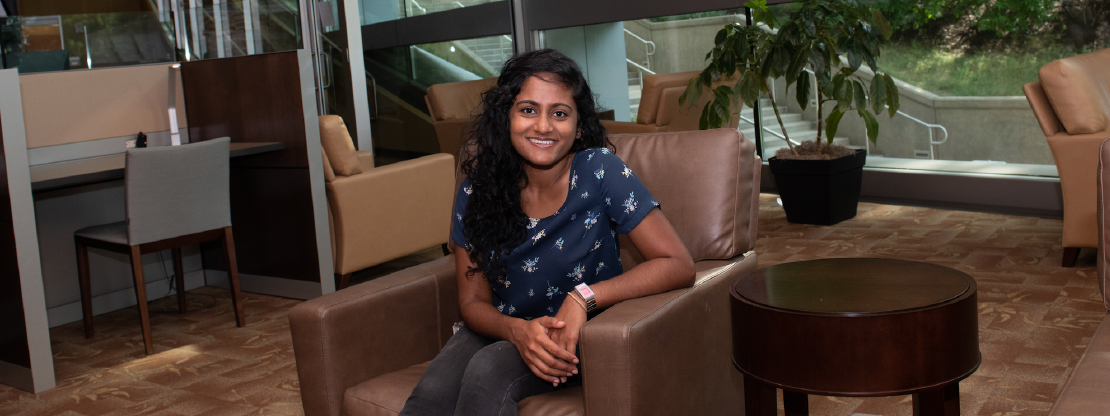Every other month, we highlight one of Van Andel Institute Graduate School’s doctoral students. This month features Menusha Arumugam, a student in the lab of Dr. Matt Steensma, who studies how the environment surrounding breast cancer tumors supports their growth and spread.
Q: How would you describe your area of study to your grandparents?
MA: Your body is made up many different types of cells – they all play specific roles and interact with each other in many ways. In your breasts, there are cells that make up the milk ducts. Around those ducts, there are different types of cells and proteins such as fat cells, immune cells and collagen. In breast cancer, only the cells that make up the milk ducts transform to become cancerous, but the non-cancerous cells around the tumor can be somewhat affected as well. My project tries to understand how a mutation can cause the neighboring cells to create an environment that helps the cancer cells thrive. Specifically, I’m trying to find out which type of cell(s) are responsible for increasing and changing the amount/structure of collagen around the ducts and cancerous cells.
Q: What is your primary motivation for persevering through graduate school?
MA: Biology has always been very interesting to me and that interest led me to pursue graduate school. Even with all the textbook facts that we have to memorize for exams etc., there is still so much we don’t understand about cancer and other diseases.
Q: What do you want to do with your degree?
MA: After graduating from Van Andel Institute Graduate School and completing my postdoctoral training, I want to lead a research lab in a clinical setting or at an academic/private institution.
Q: Did you take time off before starting your Ph.D. degree or come directly from an undergraduate or Master’s degree program?
MA: I graduated with an undergraduate degree from University of Michigan-Flint in April 2017. I took a couple months off to visit family in Malaysia and travel around Europe before starting at the Graduate School in August 2017.
Q: Did your past experiences in life or education help prepare you for graduate school, or did you have to develop different strategies to succeed?
MA: My undergraduate experience was very rewarding and has definitely helped me prepare for graduate school. My classes and coursework provided a knowledge base, my research experience helped me learn basic lab skills and resilience in science, and my extracurricular activities contributed to my professional development. From these experiences, my strategy to succeed is learning to find a balance between research and life outside the lab. Most importantly, having a supportive group of coworkers, friends and family has played a big part in getting me to where I am today.
Q: What is your favorite stress-reduction technique?
MA: It varies depending on the day/week. Painting has always been a favorite hobby — the focus and patience that I put into every artwork is very therapeutic to me. Other than that, food makes me very happy — going grocery shopping and attempting a new recipe every other week is always something I look forward to.
Q: What accomplishment (academic or other) are you most proud of?
MA: At the 11th Annual Bee Brave 5K in 2018, I ran my first 5K (in the cold!) with my mentor and crossed the finish line a couple seconds before her. I have pictures for proof and bragging rights!
Q: Are you involved in other community activities and if so, how have they shaped your graduate experience?
MA: Our lab has maintained a close relationship with local patient support groups such as NF Michigan and the Bee Brave team. We’ve attended various fundraising and awareness events organized by these groups. In addition to raising funds to support our research, they have attended lab meetings and visited our lab to learn about the research we’re doing. Meeting these women and families who have been affected by breast cancer and neurofibromatosis has been extremely impactful in shaping my graduate school experience. When the day-to-day repetitive routine of science gets frustrating, the lives of the people I’ve met through NF Michigan and Bee Brave gives me motivation, perspective and a sense of urgency to what I do. It keeps me moving forward.
Q: If you were asked to put something in a time capsule for each year you have been in the program and this capsule would not be opened for 25 years, what would you contribute?
MA: I’m not sure what I would keep from each year specifically, but I would definitely keep a copy of my first specific aims page/National Institutes of Health-style grant from first-year classes. I have not looked at that document in a while, but it makes me cringe every time I do. Once I’m done cringing, it reminds me of where I started and how much I’ve learned and grown.
